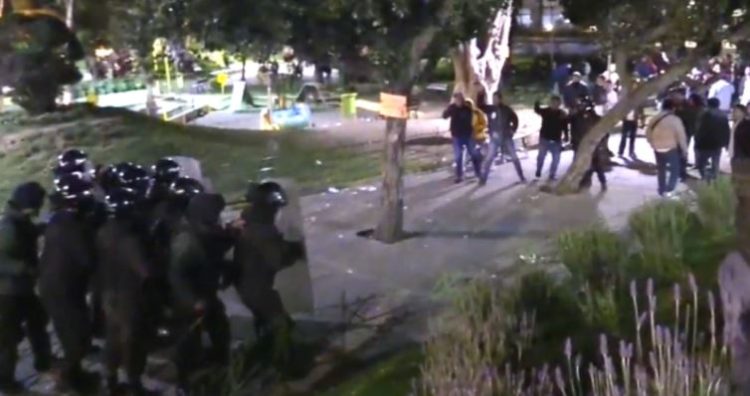President Evo Morales, the first indigenous President of Bolivia, has indicated that he will call for new elections after the Organization of American States (OAS), which carefully monitored the election, called for the results to be annulled.
Morales was facing an election, which took place on October 20, against Carlos Mesa, who was Bolivia’s vice president from 2002-2003 and the President from 2003-2005. He and the opposition are heavily based in the Santa Cruz region in eastern Bolivia.
There have been widespread protests, strikes, and roadblocks since the night of the election. At least three people have been killed. Morales’s position has been getting increasingly untenable as the people have grown angry over perceived election rigging. As the results were being tallied, the government ceased the count for 24 hours.
Morales was first accused of election rigging back in 2005. That charge was never proved, but now the OAS has found an abuse of the voting system.
After the delay, Morales was found to have garnered 47 percent of the vote and supposedly defeated Mesa by more than 10 percent. That is important because according to Bolivian law, a candidate can win the election if he/she gathers 40 percent of the vote and defeat the nearest challenger by more than 10 percent of the vote. Mesa “officially” finished with 36 percent.
On Friday, Mesa asked the country’s Congress to prepare for new elections. Then protestors overran and shut down two state-run media outlets. In further developments,, the national police have not only not quelled the protests, but have in many cases joined the protesters against the sitting president. These protests have not been isolated, but are occurring in many of the bigger cities of the country.
Adding to the pressure on Morales, the armed forces have stated that they will not deploy to confront the protesters. On Saturday, the military released a statement saying, “that we will never confront the people to whom we have a duty and we will always ensure peace, coexistence and the development of our homeland.”
OAS observers, after completing an audit found “clear manipulations” of Bolivia’s voting laws, and stated that they could not verify the results of the election. In further damaging Morales’s claim to the presidency, the OAS audit team of 36 observers found the Bolivian election as “gravely flawed”.
“In the four categories that were reviewed (technology, the chain of custody, the integrity of the ballots and statistical projections) we have found irregularities that run from very serious to suspicious,” the OAS said in its report.
Morales, seeing the writing on the wall, had at first decried the protests as a “fascist coup” against him. He was backed by the leftist president of Venezuela, Nicolas Maduro, who tweeted: “We denounce before the world the attempted coup d’etat in progress against the brother President Evo Morales.” Maduro weathered the storm of his own election issues through the help of Russia.
But now Morales is trying to extend an olive branch by offering to hold new elections, to, in his words, “pacify Bolivia.” During a news conference early on Sunday, Morales said he would replace the members of the electoral board that were alleged to have conducted fraud.
Already have an account? Sign In
Two ways to continue to read this article.
Subscribe
$1.99
every 4 weeks
- Unlimited access to all articles
- Support independent journalism
- Ad-free reading experience
Subscribe Now
Recurring Monthly. Cancel Anytime.
“In the following hours, in agreement with all political forces, we will establish the steps for this (new election),” he said.
Morales called for an urgent meeting of the four main political parties represented in the Bolivian Congress. Two of the parties, including that of his opponent Mesa, have rejected the call while one has accepted it. “I have nothing to negotiate with Evo Morales, who has lost all grip on reality,” he said.
Michael Kozak, the U.S. assistant secretary for Western Hemisphere affairs, tweeted: “Bolivian citizens deserve credible and transparent elections that they can trust to represent their will. We urge all actors to avoid violence and ensure that the forces of public order continue to exercise restraint.”
Morales has been very popular with the indigenous and poor people of Bolivia, which is one of the poorest countries in Latin America. He has reduced poverty and joblessness but like all leftists, he blames all of his problems on the United States.
Since he first took office after the 2005 election, he’s had an adversarial relationship with Washington: The two countries haven’t had ambassadorial relations since 2009.
The situation in Bolivia will gather considerable attention, as the police and military have seemingly taken sides against the ruling president; and the next elections will be closely monitored by several outside states.
Photo of Bolivian protests: YouTube Wikipedia










COMMENTS